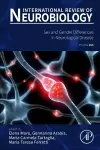
Sex and Gender Differences in Neurological Disease
4 contributors - Hardback
£145.00
Dr. Maria Teresa Ferretti is a neuroscientist and neuroimmunologist, expert in Alzheimer’s disease and gender medicine. In 2016, together with Dr. Schumacher-Dimech, Dr. Santuccione Chadha and Gautam Maitra, she co-founded the nonprofit organization “Women’s Brain Project (where she currently serves as Chief Scientific Officer), a world leader in the study of sex and gender characteristics in brain and mental health as the gateway to precision medicine. After graduating in Chemical and Pharmaceutical Technologies at University of Cagliari (Italy), she studied and worked in England, Canada (where she earned a PhD in Pharmacology and Pharmacological Therapy at McGill University in Montreal), Switzerland and Austria. Her studies have been published in numerous peer-reviewed journals, including Nature, and she is regularly invited by leading scientific conferences to lecture on Alzheimer’s disease, precision medicine and the differences between men and women in neurology and psychiatry. She has taught in numerous university courses and is currently ‘External Teacher’ at the Medical University of Vienna; in addition, Dr. Ferretti is responsible for continuous medical education courses in the field of gender and precision medicine. Passionate about scientific communication and motivated by the desire to break the stigma on mental and brain diseases, she was a TED-x speaker in 2019 and in 2021; in 2021, together with Antonella Santuccione Chadha, she wrote the book for the general public ‘Una bambina senza testa’ (Edizioni Mondo Nuovo). Dr. Annemarie Schumacher Dimech obtained her first psychology degree with honors from the University of Malta, and holds an MSc in Health Psychology from the University of Surrey (UK) as a Chevening Scholar. In 2010, she obtained her PhD at the University of Bern. Her fascination with the interaction between body and mind motivates her to study physical and environmental factors affecting brain and mental health. The sex and gender differences in various socioeconomic and psychological factors affecting brain and mental health was Dr. Schumacher Dimech’s motivation to join forces with Antonella Santuccione Chadha, Maria Teresa Ferretti, and Gautam Maitra to found the Women’s Brain Project. In her pro bono work with the Women’s Brain Project, she contributes a psychosocial perspective to various WBP activities including educational events as well as publications, research, and other scientific events. Today, she is employed at the University of Lucerne where she developed and is heading its programme of further education in Palliative Care and is currently President of Women's Brain Project. Dr. Antonella Santuccione Chadha is a medical doctor with expertise in clinical pathology, neuroscience and psychiatric disorders. She is head of stakeholder engagement for Alzheimer’s disease at Biogen. She is co-founder and CEO of the non-profit organization “Women’s Brain Project which is addressing the influence of sex and gender on mental and brain diseases. She is the Vice-president of Euresearch. As a medical doctor, Antonella has decades of experience in preclinical research, patient treatment, clinical development, medical affairs and setting up the international regulatory framework for Alzheimer’s disease. Always focused on solving the puzzles related to Alzheimer’s and other psychiatric diseases, she has worked with Swissmedic, the Bill and Melinda Gates Foundation, several European universities, the EU Commission Directorate for Health and Food Safety, the World Health Organization, the CEOi and several Alzheimer’s’ disease Organizations. Since 2018 she is listed among the top 100 Women in Business in Switzerland and in 2019 she has been elected Woman of the Year in Switzerland by the Magazine "Women in Business". In 2020, she received the World Sustainability Award for her involvement in advancing Precision Medicine. She also received the award “Premio Medicina Italia for her contribution to the management of the pandemic. Dr. Santuccione Chadha is keenly interested in removing bias when developing solutions for mental and neurological diseases to achieve precision medicines.